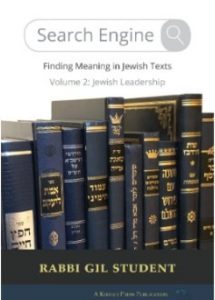 Search Engine: Finding Meaning in Jewish Texts
Search Engine: Finding Meaning in Jewish Texts
Volume 2: Jewish Leadership
Rabbi Gil Student
Kodesh Press, 2018
368 pages
Occasionally, I am asked to review books for this web site and I decline on the basis that we do not typically review books here. This review is the extremely rare exception that proves the rule. The reason I do not normally review books here is threefold: (1) if a random person asks me to review their book, I do not necessarily have the time or inclination to read it; (2) if I do read your book, I might not like it, which puts me in the awkward position of having to write a negative review, lie by writing a positive review (which I won’t do) or explain to you why I’m declining to review it (which I’d rather not do); and (3) reviewing books is typically the purview of Jewish Action, the magazine of the Orthodox Union.
Being a huge fan of Rabbi Gil Student’s work in general, I was planning on reading the latest volume of Search Engine anyway. (Full disclosure: Rabbi Student happens to be the book editor of Jewish Action.) My usual objections to undertaking reviews not applying in this instance, I happily embraced this exceptional deviation from my standard operating procedure.
Rabbi Student is a prolific writer with whom readers may already be familiar from his Torah Musings blog, formerly known as Hirhurim. The current volume of Search Engine focuses on Jewish leadership and consists of essays on a broad array of topics that fall under this aegis. Some of these have been adapted from Rabbi Student’s articles on the blog and from such publications as The Jewish Link of New Jersey, the OU’s Behind the Union Symbol, Jewish World Review, The Forward, Mosaic Magazine, and elsewhere. (The current volume is the second in a projected trilogy, the first volume of which focused on matters of Jewish life and the third of which is expected to address Jewish thought.)
Topics run the gamut from some of the most divisive controversies facing Orthodox communities today to insightful historical essays. In the introduction, Rabbi Student analyzes what he considers to be the true danger posed be the Internet, which is far removed from what many others would have us believe. From there, he goes on to address issues about which many of us have wondered, as well as topics we may never have considered but probably should have.
Can a rabbi who strays be “defrocked?” If so, for what reason and by whom? Should a rabbi or other leader shamed in a scandal be reinstated if they repent? What is the role of women in contemporary Jewish society? Does God’s response to the claims of Tzelofchad’s daughters support more sweeping changes in this area? Why did different denominations of Judaism evolve? And why did a rabbi who famously changed denominations in the 1950s regret his decision decades later? These are just a few of the many, many thought-provoking questions addressed in this volume.
Search Engine is heavily sourced with halachic and hashkafic precedent, from Talmudic authorities, through Rishonim and Acharonim, to contemporary leaders in the realms of Jewish law and thought. These are meticulously detailed so we don’t merely have the positions of Rav Shimon ben Tzemach Duran and Rav Avraham Shapira to contemplate, we know that the former lived in 15th-century Algeria while the latter was Ashkenazic Chief Rabbi, 1983-1993. Such context is extremely helpful in a work that cites such an extensive litany of authorities. Rabbi Student has undergone a truly Herculean (Samsonian?) task in curating and analyzing this scope of material.
Rabbi Student is not easily pigeon-holed. Chazal tell us (Chulin 44a) that one who always rules leniently is a rasha while one who always rules stringently is a fool. Rather than searching for sources to support a preconceived position, the intellectually honest person will evaluate the sources in order to reach his conclusion. This is what Rabbi Student advocates and also what he does. This process is what enables him to reach conservative-with-a-small-c conclusions on a variety of social issues while simultaneously penning such essays as “Why Orthodoxy Needs Its Left Wing,” an idea with which many on the far right might disagree.
“A wise person has eyes in his head” (Koheles 2:14). Any given reader may not necessarily agree with all of Rabbi Student’s conclusions, especially when he may challenge their preconceptions, but he provides more than ample food for thought on each and every topic that he chooses to discuss. His encyclopedic knowledge and the clarity of his presentation facilitate an intelligent and respectful analysis of each subject, no matter how emotionally charged it may be. I would only hope that those who wish to rebut any of his conclusions attempt to do so as calmly, rationally and with as much intellectual honesty.
Rabbi Jack Abramowitz is Torah Content Editor at the Orthodox Union. He is the author of six books, including The Tzniyus Book and The Taryag Companion. His latest work, The God Book, is available from OU Press as well as on Amazon.
The words of this author reflect his/her own opinions and do not necessarily represent the official position of the Orthodox Union.

